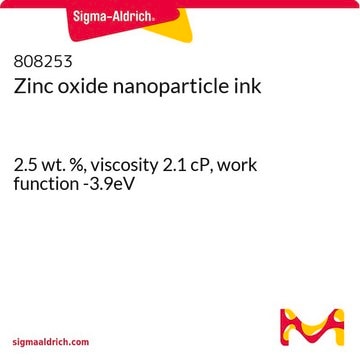721077
Zinc oxide, dispersion
nanoparticles, <100 nm particle size (TEM), ≤40 nm avg. part. size (APS), 20 wt. % in H2O
Synonym(s):
Zinc monoxide, Zinc white
About This Item
Recommended Products
form
dispersion
nanoparticles
concentration
20 wt. % in H2O
particle size
<100 nm (TEM)
avg. part. size
≤40 nm (APS)
pH
7.5±1.5
density
1.7 g/mL±0.1 g/mL at 25 °C
SMILES string
[Zn]=O
InChI
1S/O.Zn
InChI key
XLOMVQKBTHCTTD-UHFFFAOYSA-N
Looking for similar products? Visit Product Comparison Guide
Related Categories
General description
Application
hcodes
pcodes
Hazard Classifications
Aquatic Chronic 2
Storage Class
12 - Non Combustible Liquids
wgk_germany
WGK 2
flash_point_f
Not applicable
flash_point_c
Not applicable
Certificates of Analysis (COA)
Search for Certificates of Analysis (COA) by entering the products Lot/Batch Number. Lot and Batch Numbers can be found on a product’s label following the words ‘Lot’ or ‘Batch’.
Already Own This Product?
Find documentation for the products that you have recently purchased in the Document Library.
Customers Also Viewed
Articles
Operation principle and market dominance of single crystalline silicon solar cells.
Organic photovoltaics (OPVs) represent a low-cost, lightweight, and scalable alternative to conventional solar cells. While significant progress has been made in the development of conventional bulk heterojunction cells, new approaches are required to achieve the performance and stability necessary to enable commercially successful OPVs.
Among various ceramics, one-dimensional (1-D) piezoelectric ceramics have attracted significant scientific attention for use in energy harvesting.
TiO2 exhibits wide band gap semiconductor and memristor properties electronically, with high opacity and UV absorbance optically.
Our team of scientists has experience in all areas of research including Life Science, Material Science, Chemical Synthesis, Chromatography, Analytical and many others.
Contact Technical Service







